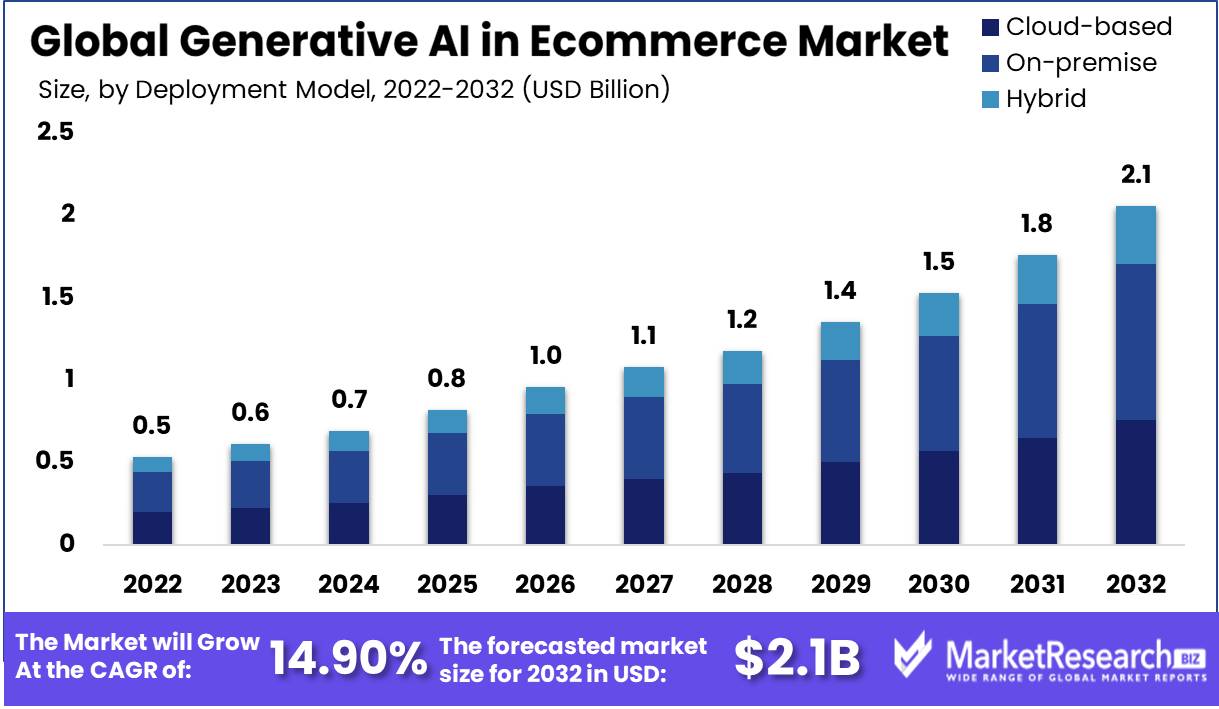Generative AI in E-Commerce Market size Hit USD 2,123.6 Mn by 2032 | CAGR 14.9%

Page Contents
Market Overview
Published Via 11Press : Generative AI in E-Commerce Market size is expected to be worth around USD 2,123.6 Mn by 2032 from USD 529.5 Mn in 2022, growing at a CAGR of 14.90% during the forecast period from 2023 to 2032.
Generational artificial intelligence (AI) in e-commerce has seen steady adoption, revolutionizing how businesses operate. Generative AI refers to a technology that enables machines to generate original content such as images, videos, or texts based on patterns or data inputs; its applications in this industry span across various aspects.
One key area where generative AI is making waves is product generation and customization. E-commerce businesses can utilize generative AI algorithms to tailor designs specifically to customer preferences – providing not only enhanced customer experiences but also new avenues of personalization in an increasingly competitive market.
Generative AI is revolutionizing product recommendations. By analyzing vast amounts of customer data such as purchase history, browsing behavior, demographic information and preferences for specific individuals, generative AI algorithms can generate highly personalized recommendations that are both accurate and appealing to individual customers – increasing customer engagement and sales as a result.
Generative AI's most significant application in e-commerce is virtual try-on and visualization. Customers can utilize generative AI models to virtually try on clothing or home decor items before viewing their image in their living spaces – creating a personalized and immersive shopping experience which not only increases engagement but also decreases returns while increasing overall customer satisfaction.
Generative AI is now being leveraged to power chatbots and virtual assistants that deliver more intelligent, tailored customer support. These AI-powered assistants can understand customer inquiries, provide product info, recommend items to purchase, handle transactions, and even handle transactions themselves! By taking advantage of generative AI for customer service capabilities and response times improvement purposes e-commerce businesses can realize improved services while creating an improved, tailored shopping experience for their customers.
Request Sample Copy of Generative AI in E-Commerce Market Report at: https://marketresearch.biz/report/generative-ai-in-e-commerce-market/request-sample/

Key Takeaways
- Generative AI is having a tremendous impact on the e-commerce market, revolutionizing various aspects of this industry.
- E-commerce businesses can now leverage this capability to offer customized product designs tailored specifically to each individual customer preference, elevating customer experiences while differentiating themselves from competitors.
- Generative AI algorithms analyze customer data to generate highly tailored product recommendations, leading to greater customer engagement and sales.
- Virtual try-on and visualization powered by generative AI allow customers to virtually experience products such as clothing or home decor, increasing engagement while decreasing returns.
- AI-powered chatbots and virtual assistants use generative AI to provide intelligent customer service that speeds up response times while providing an enjoyable shopping experience.
- Generative AI's use in e-commerce is expected to expand, driving further advancements and improvements in customer experiences, sales performance, and operational efficiency.
Regional Snapshot
- North America and, particularly the US, has been at the forefront of adopting Generative Artificial Intelligence technologies for e-commerce use. Many major e-commerce players in North America and particularly in the US have adopted Generative AI technologies in order to increase product customization, enhance recommendation systems, and create personalized customer experiences. Furthermore, there exists an active ecosystem of AI startups dedicated to eCommerce applications within this region.
- European nations have extensively used generative AI in e-commerce, with particular attention paid to ethical and sustainable practices. AI-powered customization and personalized recommendations have proven particularly successful at catering to consumer preferences across European nations. European regulators also focus heavily on protecting data privacy while encouraging ethical AI usage, which has an influence on both the adoption and development of generative AI technologies.
- Asia-Pacific countries such as China, India and South Korea have witnessed exponential growth in e-commerce and generative AI. Markets in this region have adopted virtual try-on technologies powered by AI; chatbots; voice assistants to enhance customer experiences; while in China e-commerce platforms have integrated generative AI to offer personalized recommendations as well as engage customers via interactive content delivery systems.
- Latin America's e-commerce market is experiencing rapid expansion, and generative AI is starting to make waves. E-commerce platforms are increasingly adopting AI-powered recommendation systems as part of customer retention initiatives; virtual try-on technologies are also increasingly used in fashion and beauty retailing environments to provide seamless shopping experiences between online and offline shopping experiences.
- Middle East and Africa e-commerce markets are experiencing steady expansion, as AI technologies continue to be adopted more widely. Primarily used for personalized recommendations and virtual try-on experiences, AI-powered chatbots have also proven invaluable in providing efficient customer support while streamlining transactions.
Any inquiries, Speak to our expert at: https://marketresearch.biz/report/generative-ai-in-e-commerce-market/#inquiry
Drivers
Customers Expect Highly Customized Experiences
Customers today expect highly tailored shopping experiences, which is why Generative AI allows e-commerce businesses to deliver customized product recommendations, tailored offers and one-on-one interactions at scale. By analyzing vast amounts of data relating to customer preferences and behavior patterns, generative AI algorithms enable e-commerce businesses to deliver customized customer interactions at scale.
Enhance Customer Engagement
Generative AI technologies like virtual try-on and visualization offer customers engaging and interactive experiences. By giving customers an immersive virtual try-on or visual representation of products or how they could fit into their lives, businesses can increase customer engagement while decreasing uncertainty and increasing purchase confidence.
Improved Recommendation Systems
Recommendation systems powered by generative AI can deliver more accurate and relevant product recommendations to customers. These systems use data gleaned from browsing behavior, purchase history, demographic information and more to personalize product suggestions that align with individual preferences – leading to higher conversion rates and customer satisfaction rates.
Operational Efficiency
Generative AI automates many processes in e-commerce operations, such as product design and customization. By employing AI algorithms, businesses can streamline workflows, reduce manual effort, accelerate product development cycles and ultimately achieve increased operational efficiency at reduced costs and faster time-to-market.
Recent advances in AI technologies.
AI technologies, including deep learning and neural networks, have greatly contributed to the rise of generative AI applications in e-commerce. These advances have significantly augmented AI models' capacity for understanding complex data types like images, videos and texts and manipulating them with AI models – opening up possibilities for product generation, virtual try-on services and virtual try-on.
Restraints
Data Quality and Availability
Generative AI models rely on large volumes of high-quality data for training purposes and creating accurate outputs, but obtaining such data can be challenging for businesses with limited resources or access to diverse datasets. Poor data quality or inadequate amounts may result in suboptimal performance and limit the efficacy of generative AI applications.
Ethical and Legal Considerations in Marketing Automation Systems (AMS)
Generative AI poses numerous ethical and legal concerns, particularly with respect to data privacy and intellectual property rights. AI models trained using customer data must adhere to stringent privacy regulations in order to safeguard customer information, while there are concerns over its possible misuse to produce fake or misleading content, which may undermine trust while having legal ramifications.
Bias and Fairness
Generative AI models may inadvertently reproduce any bias present in their training data, leading to biased recommendations, tailored experiences or discriminatory outcomes. To effectively address bias and ensure fairness with generative AI algorithms requires extensive data selection, preprocessing and continuous monitoring in order to limit negative consequences and minimize negative repercussions.
User Acceptance and Adoption
User acceptance and adoption can still be challenging when it comes to generative AI technologies, however. Customers may be wary about using tools powered by artificial intelligence such as virtual try-on or chatbots; preferring more conventional shopping methods. Building user trust through demonstration is crucial in encouraging adoption.
Opportunities
Customer Experience Enhancement is our aim.
Generative AI allows businesses to provide customers with highly tailored and engaging customer experiences. Offering product recommendations, virtual try-on capabilities, and interactive visualization tools allows e-commerce companies to craft immersive shopping experiences that resonate with customers – leading to greater satisfaction, loyalty, and repeat purchases.
Custom Product Manufacturing and Innovation.
Generative AI allows businesses to design products tailored specifically to individual customer preferences. E-commerce businesses utilizing these AI algorithms can generate innovative designs, allowing customers to personalize products according to their specific requirements – which fosters customer engagement and differentiates in the market.
Increased Sales and Conversion Rates
Generative AI-powered recommendation systems hold the potential to significantly increase sales and conversion rates. By analyzing customer data such as purchase history, browsing behavior, and preferences businesses can use AI to provide personalized product suggestions that increase conversion chances and drive higher sales volumes.
Operational Efficiency and Cost Savings
Generative AI can streamline various operational aspects of an e-commerce business, leading to greater efficiency and cost savings. Automating tasks such as product design, customization and customer support through AI chatbots enables companies to reduce manual effort while improving productivity and optimizing resource allocation.
Adopting Generative AI Technologies Adopting Generative AI technologies offers businesses a distinct edge in the e-commerce market. By offering tailored experiences, innovative features, and advanced visualization tools they can distinguish themselves from their competition while drawing customers in while keeping existing ones happy and becoming leaders in providing cutting-edge e-commerce experiences.
Take a look at the PDF sample of this report: https://marketresearch.biz/report/generative-ai-in-e-commerce-market/request-sample/
Challenges
User Trust and Transparency
Users may have reservations about using generative AI for e-commerce purposes, particularly regarding data privacy and the authenticity of generated content. Establishing user trust by offering more transparency around how generative AI is being employed to personalize recommendations or generate virtual experiences is paramount; companies should communicate clearly with their users in order to address any queries regarding how their data is being utilized.
Scalability
Scaling AI models to handle the large volume of data and user interactions found in e-commerce can be an immense challenge. Training and deploying models that generate personalized recommendations or virtual experiences in real-time while taking into account constantly evolving inventory levels and user preferences requires both strong infrastructure and optimization techniques for maximum effect.
Intellectual Property and Copyright
Generative AI models may generate content that closely resembles existing products or brands, raising concerns of intellectual property infringement and copyright violations. E-commerce companies must ensure their generative AI systems abide by applicable copyright laws to avoid generating content that infringes upon others' rights.
Market Segmentation
Based on Deployment Model
- Cloud-based
- On-premises
- Hybrid
Based on Technology
- Natural Language Processing
- Computer Vision
- Machine Learning
- Speech Recognition
- Augmented Reality
Based on Application
- B2B
- Personal
- Business use
- Seasonal use
- B2C
- Other Applications
Key Players
- Alibaba Group
- Walmart
- Shopify
- Magento
- com Inc
- IBM Corporation
Report Scope
| Report Attribute | Details |
| Market size value in 2022 | USD 529.5 Mn |
| Revenue forecast by 2032 | USD 2,123.6 Mn |
| Growth Rate | CAGR Of 14.9% |
| Regions Covered | North America, Europe, Asia Pacific, Latin America, and Middle East & Africa, and Rest of the World |
| Historical Years | 2017-2022 |
| Base Year | 2022 |
| Estimated Year | 2023 |
| Short-Term Projection Year | 2028 |
| Long-Term Projected Year | 2032 |
Request Customization Of The Report: https://marketresearch.biz/report/generative-ai-in-e-commerce-market/#request-for-customization
Recent Developments
- In 2019 Nike joined forces with Adobe to harness generative AI and 3D modeling technologies to provide customers with personalized shoe designs tailored to their preferences and tastes. Their project, known as Nike Adventure Club, sought to do just this.
- Alibaba, the Chinese e-commerce giant, recently unveiled “FashionAI”, an artificial intelligence project using image analysis to enhance fashion shopping experiences. By assessing images of clothing items and fashion trends, FashionAI provides tailored styling suggestions and recommendations to customers.
- In 2019, Amazon recently unveiled StyleSnap, an AI-powered feature of their mobile app that enables users to upload an image or take a photo of a fashion item they like and receive recommendations of similar items available on Amazon.
FAQ
1. What is Generative AI in E-commerce?
Ans: Generative AI in e-commerce refers to the application of artificial intelligence techniques to generate content – product descriptions, recommendations and virtual try-on experiences – that enhances customer shopping experiences.
2. How is Generative AI impactful to the E-Commerce Sector?
Ans: Generative AI offers several advantages to online retailers, including enhanced customer engagement, tailored recommendations, cost savings through automation, and increased product discovery.
3. Can Generative AI Increase Conversion Rates in E-commerce?
Ans: Yes, generative AI can increase conversion rates by offering personalized recommendations, virtual try-on, and product descriptions tailored specifically for customers – creating an enjoyable shopping experience for them.
4. Are there any ethical considerations associated with the application of AI to e-commerce?
Ans: Yes, ethical considerations involve ensuring transparency and disclosure of AI-generated content, avoiding biased or discriminatory material and safeguarding customer data privacy.
5. How can generative AI improve content creation efficiency for e-commerce platforms?
Ans: Generative AI can automate repetitive tasks such as product variations and description generation, saving both time and resources for online businesses.
6. What role can Generative AI play in aiding product discovery?
Ans: Generative AI makes product discovery simpler for customers by automatically creating product descriptions and tags, streamlining the browsing experience.
7. Can Generative AI enhance virtual try-on experiences for customers?
Ans: Yes, generative AI can create virtual try-on experiences by producing realistic product visualizations allowing customers to virtually test products before making purchases.
8. Can Generative AI assist in providing personalized product recommendations?
Ans: Generative AI algorithms can analyze customer data and behavior to provide personalized recommendations tailored to individual preferences that have a greater chance of a conversion.
9. What effect is Generative AI having on customer satisfaction in E-Commerce?
Ans: Generative AI improves customer satisfaction by offering tailored experiences, decreasing purchase uncertainty and streamlining the shopping journey with tailored recommendations and content.
10. Does Generative AI dominate the E-commerce Sector?
Ans: Generative AI has quickly gained ground in the e-commerce sector, as more businesses utilize its capabilities to enhance customer engagement, conversion rates and operational efficiencies. Yet adoption may vary according to company size or sector.
Contact us
Contact Person: Mr. Lawrence John
Marketresearch.Biz (Powered By Prudour Pvt. Ltd.)
Tel: +1 (347) 796-4335
Send Email: [email protected]
Content has been published via 11press. for more details please contact at [email protected]
The team behind market.us, marketresearch.biz, market.biz and more. Our purpose is to keep our customers ahead of the game with regard to the markets. They may fluctuate up or down, but we will help you to stay ahead of the curve in these market fluctuations. Our consistent growth and ability to deliver in-depth analyses and market insight has engaged genuine market players. They have faith in us to offer the data and information they require to make balanced and decisive marketing decisions.



